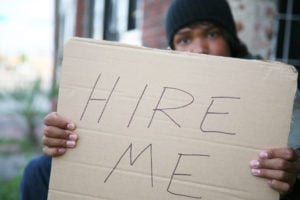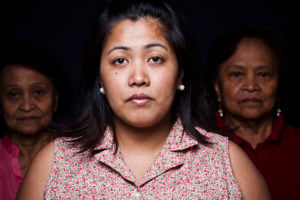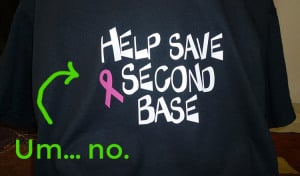
“Hire me” sign held out by an unemployed person on a street.
Our culture heaps praise on people who get out of debt.
I would know. When I paid off my student loans and wrote about it online, people started a thread saying I was doing it right.
At the same time, they attacked the 43 million people who still had student debt, calling them entitled for complaining about the rising cost of college.
After all, celebrating those who manage to get out of debt as virtuous has a dark side: It perpetuates a culture that demonizes those who don’t pay off their debts.
Those who file for bankruptcy are “lazy deadbeats.” They’re “irresponsible” for taking on debt they can’t afford. Those who default on their student loans are “making poor decisions with other people’s money.”
This finger-pointing at people who can’t pay their debts needs to stop.
Oppression related to class, race, gender identity, and physical ability can hold people back from paying the money they owe. Student debt, for one, hurts low-income people and people of color the most. But too often when we talk about it, we picture someone who’s white and middle-class.
Most Black graduates (80%) take on debt to earn their bachelor’s degree. Latinx students borrow at same rates as those who are white for public schools, but nearly 90% borrow to attend private, nonprofit schools, compared to only 72% of white students. Even for a two-year associate’s degree, nearly 60% of Black students borrow, next to 32% of those who are white.
When we shame those claiming bankruptcy or defaulting on student loans, we opt into a system that that blames poor people for their problems, rather than criticizing the institutions that put them in debt in the first place.
While we should celebrate hard work and financial responsibility to a point, how much privilege we have determines how well those traits serve us. People keep believing the myth that any hard worker in the US can pull themselves up by their bootstraps, which is untrue.
Born and raised in Idaho, which is very conservative, I believed that myth.
I heard stories about my father growing up poor with his parents alternating working days and nights to support their five sons. I saw how my dad went into the military to get out of that environment and later founded a small business.
Inspired by my father’s work ethic, I saw hard work as a solution to many of life’s problems. I’ve worked more than twenty jobs since age fourteen – including housekeeping hotel rooms, driving a garbage truck, and digging national forest trails. I paid off my student loans in a year after graduation without any direct family help.
My dad recently told me he didn’t help me pay for college because he wanted to see me earn it and not take the opportunity for granted. But as time passes, I realize more and more that my supportive family, the quality public school system I attended and my privilege being white, middle-class, cisgender, and able-bodied set me up to be debt-free.
The thought that we alone are responsible for our economic standing in society is tempting. Most of us know someone like my dad who struggled growing up and later improved their financial status. We want to believe if everyone just worked a little harder and put in a little more discipline, they’d all be better off.
The rags-to-riches American Dream relies on these principles. It feels empowering to think that personal motivation is the only limit to our potential, rather than also being constrained by systemic oppressions we can’t control.
Furthermore, it can be hard for people who’ve managed to get debt-free to accept that they probably had some advantages that helped them earn that status.
Marginalized people have many barriers that stop them from repaying their debts. Here are some things to consider about folks with college loans – before celebrating those who don’t have debts or can pay them off.
1. No Financial Support From the Family
As Americans, we value independence – or at least the appearance of it. We celebrate “self-made millionaires” and “self-taught” leaders. We measure our own worth in how we can meet the barometer of individual success.
However, as aging expert Bill Thomas once told me, this independence is an illusion.
Many people who do well have a team of supporters behind them. With student debt, maybe it’s a family member who’s helping pay for college, or like in my case, parents who let them stay at home over the summer rent-free, so they can dedicate their paychecks to education.
Unsurprisingly, those who don’t have as much of a support system have a harder time.
More than half of young adults of color, for instance, say they can’t depend on family for $1,000 for tuition or an emergency, according to a recent GenForward poll. Only a third of white people say the same.
Barriers like growing up in the foster system or facing family rejection for being LGBTQIA+ can also leave students to shoulder college’s financial burden themselves.
Even federal student aid assumes parents are helping their grown kids with school. A boost from family wealth can help someone graduate with little or no debt and start building savings and credit. When federal aid falls short by factoring in parents who can’t pay, folks may turn to spendier private loans to make up the difference. These are harder to pay back.
Paying thousands of dollars in student loans can suffocating if you’re the only one doing it. As much as we celebrate independence in this county, too much can actually bar us from success.
2. Starting College with a Low Income
Although many graduates are stuck working low-wage jobs, our culture still teaches college is how we move up in life.
When folks work low-paying jobs, some folks think the workers make what they deserve. After all, if they wanted to earn more, they could just go to college. Don’t they have scholarships and grants for poor students?
More and more, the answer is no. In fact, some scholars argue over-reliance on loans keep poor people poor.
Since the 1980s, financial aid for college “has quietly transformed from a system relying primarily on need-based grants to one dominated by loans,” researcher Pamela Burdman writes.
It’s soothing to think that college is a silver bullet. If we frame low-income folks as responsible for their struggles, we can forget we have a responsibility to help fight the institutional problems that put them there.
The assumption also feels oddly empowering, like we are in control of our futures, if only we seize the opportunity. But for those who want to use college to rise out of poverty, the route is not easy – especially if they have raising kids or finding a job to worry about too.
After the Great Recession in 2008, more low-income Americans have failed to pay their debts as many states stopped investing in public colleges and prices rose.
With far fewer grants for low-income students, more students need to borrow than ever. And while most lower-income folks borrow less money than wealthier ones, they’re also more likely to default, or fail to pay their loans.
According to the New America Foundation, hundreds of colleges across the country expect low-income students to pay large chunks of their family incomes.
In fact, though they’re least likely to attend college at all, the poorest fifth of US households face the largest burden of student debt, according to the Pew Research Center. What would be easy for someone with a higher income to afford is harder for low-income folks for pay off.
More than a third of people who default on student loans owe less than $5,000.
We may like our answers to social problems simple. But we all need to remember attending college is just one factor in social mobility. And other factors aren’t as controllable.
3. Dropping Out of School
Even with millions shouldering student debt, we still hear about how paying for a degree to get better career opportunities is worth the investment. After all, those with bachelor’s degrees make an average of $1 million than those with only a high school education.
That is, unless someone picked a liberal arts degree instead of one in science, technology, engineering, or math. Then folks wonder what they expected. (Full disclosure: I was a journalism major.)
The thought that college and other expensive things are worth paying for is widespread. Many people agree with maxims such as “You get what you pay for” and “Money makes money.” In this framework, taking on debt to afford an education feels like a valid risk.
The potential to get a better job means better money and maybe even more happiness. However, this assumption only works if everyone finishes their degrees. And not everyone does.
For many, rising tuition and fees make working through school impossible. Many jobs during the school year don’t cover the cost of the degree and may distract from studies. Even fifteen hours on the clock during the school year make engineering students less likely to graduate, for instance.
We shouldn’t be surprised nearly 40% of low-income borrowers drop out.
Furthermore, more than two-thirds of Black students who drop out say student debt is the main reason they left school.
Meaning that not only do marginalized groups suffer from high debt after they graduate, but they’re often stuck paying debt for a degree they never finish. Pair this with fewer job opportunities and a discriminatory application process, and paying off debts becomes even harder.
No one wants to be cheated. But debts from an unfinished degree are a sure way to feel taken advantage of.
4. Lack of Access to Financial Education
Those who read a lot of financial blogs may argue anyone can pay back their loans if they take advantage of programs to pay off debt based on their income. In some cases, they might not need to make payments at all.
This is true. And it’s reassuring to know that payment plans keep struggling people in mind.
However, sometimes folks use that information to imply that people who can’t pay off their debts are incompetent. This generalization is unfair because certain groups that need to know about these programs are less likely to know about them.
Take dropouts, who disproportionately suffer from student loans.
As the Portland Press Herald argues, dropouts don’t get the repayment information that many graduates get. They also go without more pro-active “targeted support – financial, academic and familial – that helps low-income Americans go to college, and stay there through graduation.”
After all, poor borrowers have different needs than middle- and upper-class lenders. Many spend nearly half of their incomes on debt just to keep the lights on and scrape by on paltry emergency savings and low-wage jobs.
“Furthermore, a study by Laura Tach of Cornell University and Sara Sternberg Green of Harvard University finds that many families view the idea of needing help – especially in the form of government assistance – as shameful,” writes Bridget Ansel in Equitable Growth.
“Instead, these borrowers try to manage their debt in private in order to project a self-sufficient social identity, sometimes cutting themselves off from helpful resources and making their financial woes worse.”
People seem like they can change their own behavior easier than a whole system can change. It’s easier to blame people for not understanding how to handle their student loans, rather than scrutinize how well lenders and colleges offer the information.
Of course, students who borrow should read the fine print on their loan paperwork – too many just skim, one university financial planning expert tells CNN. But the more privilege you have, the less times ignorance comes back to bite you. Strangely, the most financial aid help goes to those who need it the least.
5. Lower-Paying Jobs and Employment Discrimination
Prevailing attitudes say that folks with student loan debt need to get work, even if it’s not the most ideal, to pay off their loans. They say millennials, in particular, need to be realistic and know they aren’t going to have their dream job right off the bat.
Despite older people’s effort to demonize another new generation, recent grads seem to understand that already. Nearly half are working jobs that don’t require a college degree – many low-wage positions – according to the Economic Policy Institute.
Furthermore, the gender pay gap means that women have lower earnings to pay off debts and take on more debt over their lifetimes.
The disparities become even worse when we factor in race, sexual orientation, gender identity, and disabilities.
The American Association of University Women found women college graduates of color in particular find paying off their student debt hard. Within three years, Latina women only paid off 3% of their debt, compared with white women who paid off 37%.
A recent Brookings Institute report also found that within four years of graduation, Black graduates of any gender owe almost two times as much as student debt as those who are white. Black grads are also three times more likely to default.
“The debt rise largely reflects higher enrollment among blacks in college and graduate school, which typically leads to better careers and an earnings boost,” says The Wall Street Journal’s Josh Mitchell. “But it also threatens to increase wealth inequality as blacks carry higher balances while persistently earning less than whites in the workplace.”
Seeing low- and middle-income earners’ wages stagnate while high-income folks’ earnings increase doesn’t help.
To note, I followed that “get a job, any job” method to pay off my student loans to a T. I threw half of my salary as a newspaper copy editor and all my life savings at my debt.
If I had anyone else to support, grown up poorer or had a chronic illness, there would be no way I’d deplete my bank account to pay off my debts. If I owed more money than I did, if I knew my middle-class family couldn’t chip in an emergency, I wouldn’t either. I’d have too much to lose.
My privileges didn’t stop me from losing my job a week after I paid my student loans off. I went on food stamps a few months later because freelancing and part-time work didn’t pay the bills. If the timing happened any differently, I’d likely be among those with unpaid debts as well.
After all, sometimes luck makes the difference between having debt and being debt-free.
***
“Due to the compounding nature of marginalizing structures, student loans place additional burdens on people affected by classism, racism, sexism, ableism, homophobia, transphobia, and xenophobia. From the application to the last repayment, student loans restrict access to resources for marginalized populations,” says Brian Agnew, a consultant and analyst who researches how student loans contribute to systemic poverty. “The current student loan regime contributes to systemic inequality.”
So many factors contribute to someone’s ability to pay off debt. To ignore that further exploits already marginalized populations. We have to relearn centuries of equating bill-paying with morality.
Furthermore, we have to start holding universities, governments, and banks to higher standards. Businesses don’t deal with debt in moralistic terms like individuals do.
Personal finance expert Lynnette Khalfani-Cox argues on The Grio that while society labels individuals struggling to pay debts “immoral,” corporations, banks, and others continue to not meet their own obligations, but get a pass on the moral judgments.
Take the $700 million bailout of banks in 2008, for one.
Indeed, the double standard we hold to businesses versus individuals is stark. Why do we moralize the society’s more vulnerable groups so intensely? More importantly, how can we stop?
We need to start asking our government and universities what they plan to do about cutting struggling students’ debt burden.
We need to question mainstream narratives that only call attention to white, middle-class graduates struggling with student loan debt, when low-income students of color and dropouts suffer the most.
Of course, we can still support financial responsibility. Advocating for better education for every borrower is one way to do so. We can also argue for anti-discrimination laws that hold companies accountable for being responsible by fairly paying their employees, no matter their gender, gender identity, or sexual orientation. Think of other ways we can set people up to succeed.
Blanket disdain toward marginalized people who can’t pay their debts is easier than systemic reform of the institutions who lend to them, but far less productive.
[do_widget id=’text-101′]
Emily Zak is a freelance writer based out of Santa Fe, New Mexico. She writes extensively on LGBTQ+ issues, and her work has appeared on Ms. Online, Bitch Media and Care2, among others. Follow Emily on Twitter @EmilyEZak.
Search our 3000+ articles!
Read our articles about:
Our online racial justice training
Used by hundreds of universities, non-profits, and businesses.
Click to learn more




















